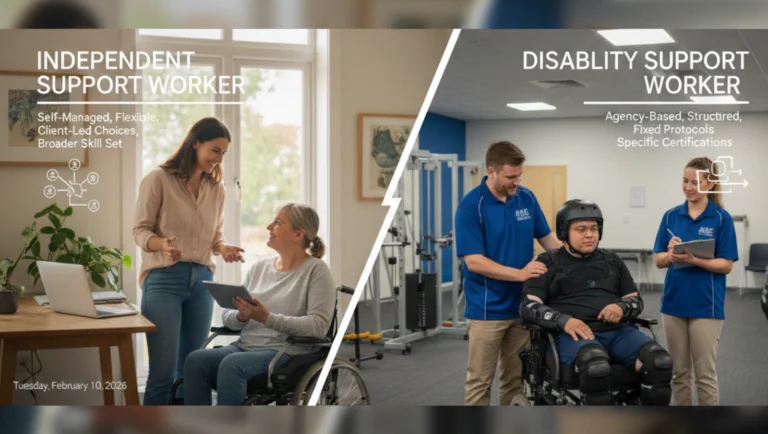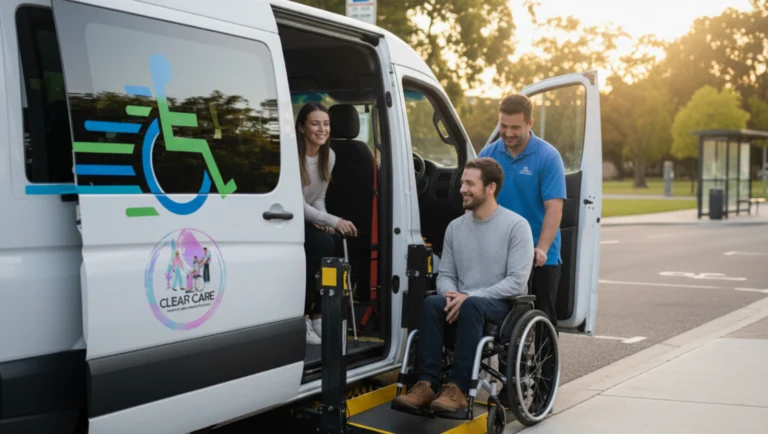Table of Contents
For many people with disabilities, having the right support can make everyday life easier, more fulfilling, and more independent. Within the National Disability Insurance Scheme (NDIS), support worker are one of the most valuable forms of assistance available. Yet, many participants and their families still have questions about what support workers actually do, how to choose the right one, and what to expect.
This blog brings together some of the most common NDIS Support Worker FAQs for people with disabilities. The goal is to provide clear, straightforward answers to help you feel more confident in making decisions about your care and support.
What Does an NDIS Support Worker Do?
An NDIS support worker is there to help participants achieve their goals and live life with greater independence. The role is flexible and depends on each person’s individual needs and NDIS plan.
Support workers may:
- Assist with personal care such as showering, dressing, and meal preparation.
- Help around the home with NDIS cleaning services, laundry, and shopping.
- Provide support with mobility, equipment, or medical routines.
- Accompany participants to community activities, appointments, or social outings.
- Encourage independence by teaching skills like budgeting, cooking, or using public transport.
For people with disabilities, this support is not just about tasks—it’s about dignity, respect, and having someone who empowers you to live the way you choose.
How Do I Choose the Right NDIS Support Worker?
Finding the right support worker is one of the most important decisions you’ll make under the NDIS. The right match can make your life smoother, while the wrong fit may feel frustrating.
Here’s what to consider:
- Your needs first – Identify the type of support you require (personal care, transport, social support, or a mix).
- Compatibility matters – Look for someone whose personality and communication style make you feel comfortable.
- Experience counts – Especially if you need support with specific conditions, equipment, or medical routines.
- Trial periods help – Many providers allow short trial shifts so you can see if the worker is a good match.
- Flexibility and reliability – Choose someone you can depend on and who can adapt to changes in your routine.
Remember: under the NDIS, you have choice and control. You are not stuck with a worker who isn’t right for you. Also, it’s important to ensure your worker has completed a NDIS worker screening check for your safety and peace of mind.
What Skills Should an NDIS Support Worker Have?
Not every skill comes from a textbook. The best support workers combine professional knowledge with personal qualities that build trust and comfort.
Core skills include:
- Empathy and patience – Respecting the fact that everyone has unique challenges and goals.
- Strong communication – Listening carefully, speaking clearly, and respecting your preferences.
- Reliability – Being on time and consistent with the support they provide.
- Problem-solving – Staying calm and flexible when things don’t go to plan.
- Respect for independence – Supporting without taking over.
Specialised skills may include:
- First aid and CPR training.
- Knowledge of assistive technology and mobility aids.
- Experience supporting people with complex or high needs.
- Cultural sensitivity and an understanding of disability rights.
The right blend of these skills ensures you receive safe, respectful, and empowering support.
Can I Choose My Own NDIS Support Worker?
Yes. One of the key principles of the NDIS is that participants have choice and control over their supports. This means you can select the support worker you feel most comfortable with.
The way you manage your NDIS plan can affect your options:
- NDIA-managed plans – You choose from workers employed by registered providers.
- Plan-managed plans – You get flexibility to choose providers and workers, with the plan manager handling invoices.
- Self-managed plans – You have full freedom to directly hire the workers you want, whether they’re registered or not.
For people with disabilities, this freedom ensures you can choose workers who understand your lifestyle, culture, and personal preferences.
How Do Support Workers Improve Daily Life?
The impact of a good support worker is often felt beyond the tasks they perform.
- Independence – They encourage skill-building so you can achieve more on your own.
- Confidence – With support, you may feel ready to try new activities or experiences.
- Community participation – They can help you get involved in social groups, sports, or hobbies.
- Reduced isolation – Having a consistent, trusted person around helps prevent loneliness.
Example: A participant with a passion for art may have a support worker help them join a local painting class. The worker provides transport, assistance during class, and encouragement, turning a personal interest into a confidence-building community activity.
Common Issues and How to Address Them
Even with careful planning, challenges can arise in working relationships with support workers.
- Mismatch in expectations – Set clear goals and responsibilities at the beginning. Use a written service agreement if possible.
- Communication breakdowns – Have open, respectful conversations about what’s working and what isn’t.
- Unreliability or poor fit – If problems continue, you have the right to request a new support worker.
If serious issues arise, you can contact your provider, plan manager, or the NDIS Quality and Safeguards Commission for advice and assistance.
Quickfire NDIS Support Worker FAQs
Do support workers need formal qualifications?
Not always. Many have training in disability or community services, but experience and empathy can be just as valuable.
Can I request a same-gender support worker?
Yes. You can request support workers based on gender, culture, or personal comfort.
How many hours of support can I get under the NDIS?
This depends on your funding and the goals in your NDIS plan.
Can I change my support worker if I’m unhappy?
Absolutely. You are not required to continue with a worker who isn’t the right fit.
Do support workers provide transport?
Yes, many assist with travel to appointments, social activities, and community events.
Conclusion
For people with disabilities, support workers are more than just helpers—they are partners in building independence, confidence, and quality of life. By understanding the role of support workers and knowing your rights under the NDIS, including awareness of NDIS Support Worker Pay Rates 2024, you can make informed choices about who supports you and how.











